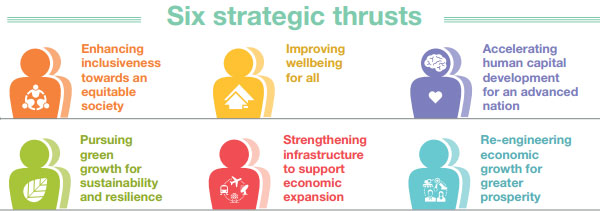Malaysia’s economy is now in transition. Confronted by the
pressures of a contracting globalization and the threat of being caught in the
middle-income trap, Malaysian Government unveiled the New Economic Model (NEM)
that was needed to transform Malaysia economy by 2020.
One of Malaysian Government initiatives is the Eleventh
Malaysia Plan for 2016 to 2020 (also known as Rancangan Malaysia ke-11). The
plan sets target and define some economics policies to reach the ultimate goal
to make Malaysia a high income economy by 2020. The key target for the
whole plan is for Malaysia to reach the advanced
economy status, that is to say a national
income per capita above USD 15,000.

The
six strategies thrusts in Eleventh Malaysia
Plan.
Enhancing inclusiveness towards an
equitable society
·
To enable all citizens – regardless of gender,
ethnicity, socio-economic level, and geographic location – to participate in
and benefit from the country’s prosperity
Improving wellbeing for all
·
To enhancing productivity and mobility, while
simultaneously strengthening social cohesion and national unity..
Accelerating human capital development for
an advanced nation
·
Human capital development is a critical enabler
for driving and sustaining Malaysia’s economic growth and supporting the
transition of all economic sectors towards knowledge-intensive activities.
·
An efficient and effective labour market is also
necessary to attract investments into Malaysia and enable everyone to
participate in and enjoy the benefits of economic growth.
Pursuing green growth for sustainability
and resilience
·
To pursue development in a more sustainable
manner from the start, rather than a more conventional and costly model of
‘grow first, clean up later’.
·
Will ensure that Malaysia’s precious environment
and natural endowment are conserved and protected for present and future
generations.
Strengthening infrastructure to support
economic expansion
·
Infrastructure development ensures that the
rakyat have access to essential amenities and services such as transport,
communications, electricity and clean water.
·
An efficient infrastructure lowers the cost of
doing business, which in turn improves national competitiveness and
productivity.
Re-engineering economic growth for greater
prosperity
·
To ensure that the aspiration of becoming an
advanced economy is attained.
·
A strong and broad-based economy, producing
high-value goods and services, will generate the high-paying jobs associated
with an advanced nation.
·
The economy must be placed on a solid foundation
to withstand external shocks and generate undisrupted prosperity for the
people.
Government
also identified another six "Game Changers" that will change the
country's economic growth and enable it to reach the economic goals. the six
"GameChangers" are:
1.
Unlocking the potential
of productivity
Broad-based
initiatives will be developed and tailored for each sector with targets set and
monitored. At the national level, productivity-linked incentives will be
introduced and regulatory reforms will be accelerated. At the industry level,
industry champions will spearhead industry-specific productivity initiatives,
while at the enterprise level, incentives and upskilling programmes will be
provided.
2.
Uplifting the B40
households (bottom 40% household income group) towards a middle-class society
Implement
strategies to raise the income and wealth ownership of the B40 households,
address the increasing cost of living, and strengthen delivery mechanisms for
supporting B40 households. The Government will also introduce the
Multidimensional Poverty Index (MPI) to ensure that vulnerability and quality
of life is measured in addition to income.
3.
Enabling industry-led
Technical and Vocational Education and Training (TVET)
Encourage
industry-led interventions and programmes as they are the stakeholders best
placed to ensure that the supply of graduates meet their requirements.
4.
Embarking on green
growth
Achieving
these aspirations requires a fundamental shift away from a ‘grow first, clean
up later’ development model towards one that views resilient, low-carbon,
resource-efficient, and socially inclusive development.
5.
Translating innovation
to wealth
Focus
on strengthening relational capital by improving collaboration among all
stakeholders. Innovation will be targeted at both the enterprise and societal
levels, instead of previous efforts which focused primarily on national-level
initiatives.
6.
Investing in competitive
cities
Creating
density to increase efficiency; expanding transit-oriented development to
enhance mobility; and strengthening knowledge-based clusters to facilitate
agglomeration and innovation. These master plans will take into account each
city’s competitive advantages, and will be formulated by the respective local
authorities in consultation with the private sector and civil society.
As for the conclusion, we can
see that there’s a lot of government plans and efforts to increase income per capita in
Malaysia. We just hope all of the plans will be successful in order to increase
our living standard. Thank you for reading my blog!
No comments:
Post a Comment